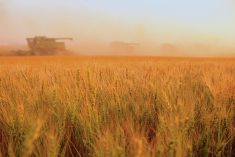Research from a recent $1.9-million federal funding announcement will have a more philosophical take on the future of sustainable agriculture.
The research hopes to answer questions such as ‘What are the social barriers to sustainable farming and food?’ and ‘How can the burden and benefits of that transition be shared equitably?’
The federal government pledged the cash March 19 to launch the Common Ground Canada Network. The initiative will be led by Dalhousie University’s Karen Foster, Canada research chair in sustainable rural futures for Atlantic Canada.
Read Also

Trump auto tariffs are coming, but not all levies will be imposed April 2
U.S. President Donald Trump said on Monday automobile tariffs are coming soon even as he indicated that not all of his threatened levies would be imposed on April 2 and some countries may get breaks, a move Wall Street took as a sign of flexibility on a matter that has roiled markets for weeks.
“Producers are already taking action to make their operations more sustainable … This knowledge sharing network will help amplify the work already underway and increase adoption of these best practices,” an Agriculture Agri-Food Canada news release read.
The hard science of sustainable agriculture, things like improved agronomic practices, are already the purview of other research organizations and government funding streams. The network, in contrast, has a goal to tackle the topic from the angle of sociology, social anthropology, political sciences, economics, the humanities and other lenses.
Foster, who is a social scientist, gathered a group of other researchers and applied for the funding to start the network
“I think it arises from this recognition that in many cases we know the technology is there … but there are some social barriers in the way to adoption,” Foster said.
There are also social processes through which people are assured “that if we adopt a certain policy in the name of sustainability, it’s actually going to work.”
The network is also concerned with the “just transition” towards sustainable agriculture—how both the burden and benefits of change could be equitably shared.
This could include topics like farmland ownership—as is the case in work done by network members Annette Desmarais, Andre Magnan and others, on land ownership in Saskatchewan. That research indicated that investor-owned farmland had increased 16-fold between 2002 and 2014.
In a March 2023 opinion piece, published in the Manitoba Co-operator, Magnan and Desmarais said that by 2018, investors owned nearly one million acres of Saskatchewan farmland.
“Given that, on average, investors pay more for land compared to other buyers, these deep-pocketed buyers have undoubtedly contributed to the rapid increase of farmland prices,” they said.
Network members have also studied what areas of food and agriculture venture capitalists are most likely to invest in; the growing reliance of even small-scale farms in Nova Scotia on temporary foreign workers and the potential social and environmental effects of local food movements and their attempts to compete with big economic players.
The five-year project’s overall goal is to increase access to and use of the social sciences in the pursuit of sustainable agriculture in Canada.
The network says they will gather researchers and agriculture and food system representatives, such as governments, community organizations and Indigenous groups, to hash out shared goals and form connections between social science researchers and other fields.
Their plan also includes the development of holistic sustainability goals and the direction of resources to where they’re most needed within the network.
Foster said the network already has dozens of academic and community partners across Canada. According to the AAFC news release, these include the Arrell Food Institute, Food Secure Canada, the National Farmers Union, Humane Society International, Farm to Cafeteria Canada and others.













